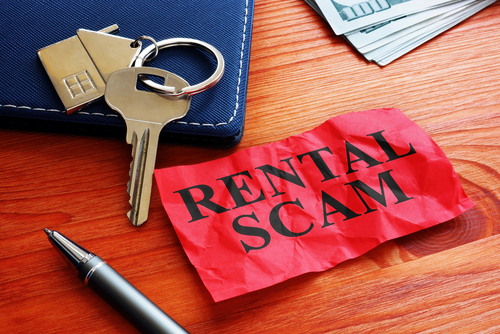2023 was the highest year on record for ‘rental scam’ searches in the UK, with an increase of 11% from 2022 to 2023.
In 2022 and 2023, there was a total of 5,720 searches for ‘rental scam’ in the UK – a 55% increase from the searches recorded in the previous two-year period. Searches for rental scams on OpenRent and Facebook have both significantly increased since 2022.
With demand for rental property increasing considerably during the last few years, especially in major cities like London, there are limited options available for renters. As prices continue to skyrocket, rental agreements that fall below the current market value can be appealing for prospective residents.
Rental scams have become rife with online fraudsters that typically target students, young professionals and other inexperienced renters with lower incomes – who are often more desperate to find a rental property and are now turning to social media platforms like Facebook to find listings.
Research by SBA Property Management has found that there was an 11% increase in Google searches for ‘rental scam’ in the UK from 2022 to 2023 – with October 2023 being the highest month on record for searches. This can be attributed to students returning to their studies in the city, or young professionals entering the graduate job market.
Searches for rental scams on OpenRent and Facebook have particularly shown a steep increase – in 2023, there were 3,410 Google searches for ‘Openrent scam’ in the UK, representing a 40% increase from the 2,440 searches in 2022. Similarly, since 2022 there has been a surge in searches for ‘Facebook rental scams’, with a 233% increase in 2022 and 2023 on the searches recorded in the preceding two-year period.
Although the increase in searches for rental scams shows that this type of fraud is becoming more prolific, it also demonstrates an increased awareness of scams among prospective tenants. With renters becoming more vigilant, this should help to combat the issue over time. However, there is still more that needs to be done to raise awareness of rental scam red flags.
With demand for rental property in the capital so high, it comes as no surprise that rental scams are also on the rise. Renters need to be aware of scams, particularly on OpenRent and Facebook and during busy periods such as October – where research has shown an increase in search enquiries.
Property managers must be aware of the latest rental scam tactics, not just to keep themselves informed but also to raise awareness among their landlords and tenants, to reduce the risk of them becoming involved.
Here at SBA Property Management we share our top tips to avoid rental scams.
Pay attention to images of properties
To avoid getting involved in a scam, prospective renters should download the images used in a property listing and search for the images on the internet using an image tool search. This method will help to identify if they are original or have been copied from another listing.
Compare rental prices within the area
It is important to compare the price of a rental property against similar properties in the area that you’re looking to live in. If a price is considerably lower, it’s usually a sign that it’s too good to be true!
View the property in person
It is essential to view a rental property in person before committing to a lease. Landlords that offer virtual viewings may not always be legitimate.
Viewing in person is also a good way to check for any potential damage or maintenance works required on the property before you move in. Property management companies can offer guidance on rental checklists and things to look out for, for both landlords and tenants.
Undertake the screening process
The screening process is an essential part of any rental agreement, and it’s therefore essential that tenants undergo this process. For legitimate listings, submitting a record of your credit history is routine. Landlords are also legally obliged to be registered with a tenancy deposit scheme, so this is a good sign of a legitimate listing.
Read the fine print
To avoid entering into a rental scam, you should always ask for copies of relevant documents from the landlord or property manager before signing a contract. Essential documents to read include gas and electricity safety certificates.
Do your due diligence on the landlord or letting agency
It’s essential that all prospective renters do their due diligence before entering into any agreements. Any established businesses should have a verifiable online presence, so you must do your research on the landlord or letting agency before proceeding.
Another way to qualify that the person renting the property is the actual owner is by using the Land Registry Database. It only costs £3 to do an online search; so is well worth doing to avoid being scammed out of potentially a lot more money!
With rental scams set to continue to increase in 2024, property management companies need to be aware of the latest scams to avoid getting involved. Property managers should also inform landlords of the latest regulations to ensure they remain compliant and communicate in a timely and accurate manner with prospective tenants.













.png)


.png)



Join the conversation
Be the first to comment (please use the comment box below)
Please login to comment